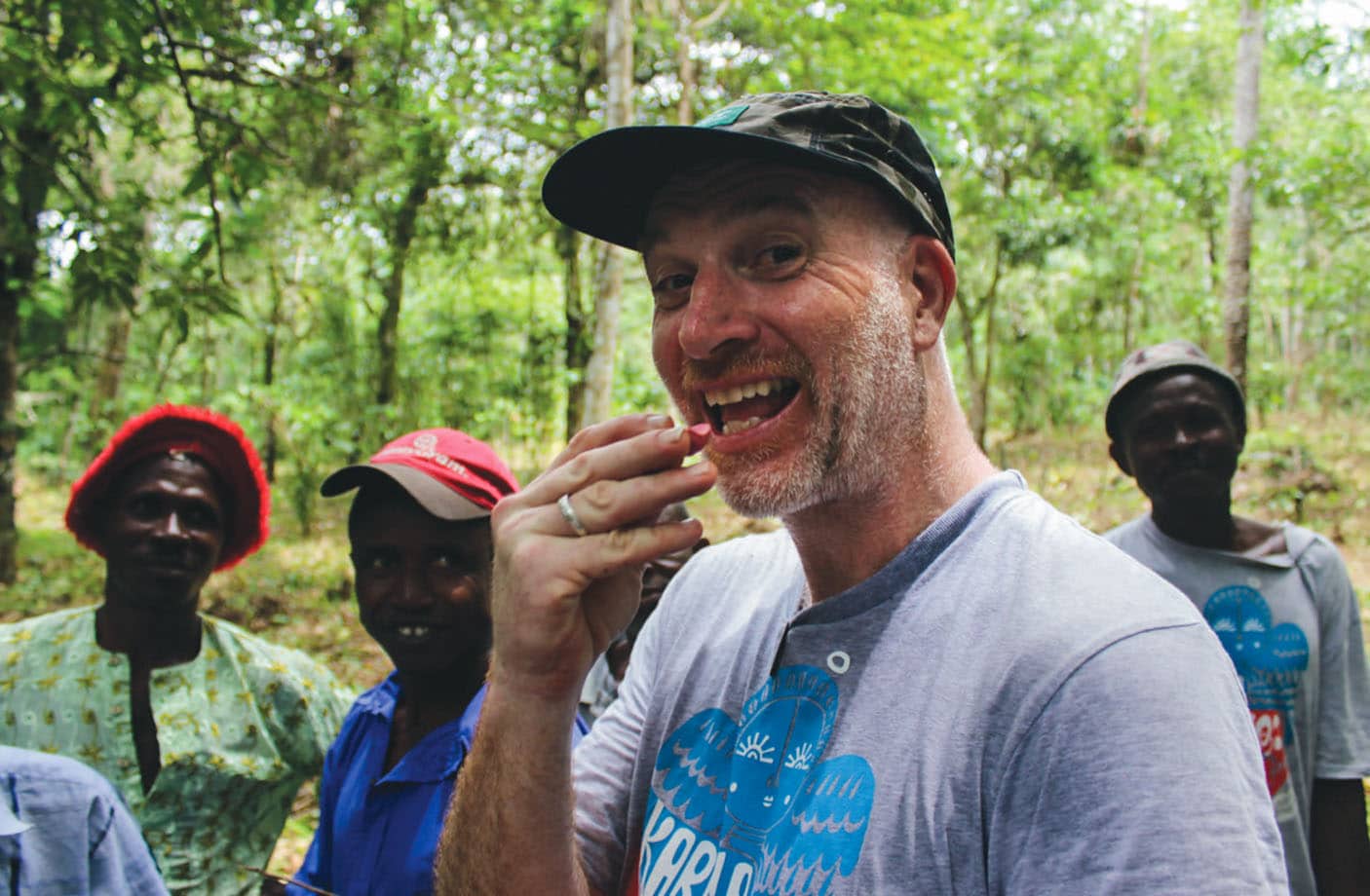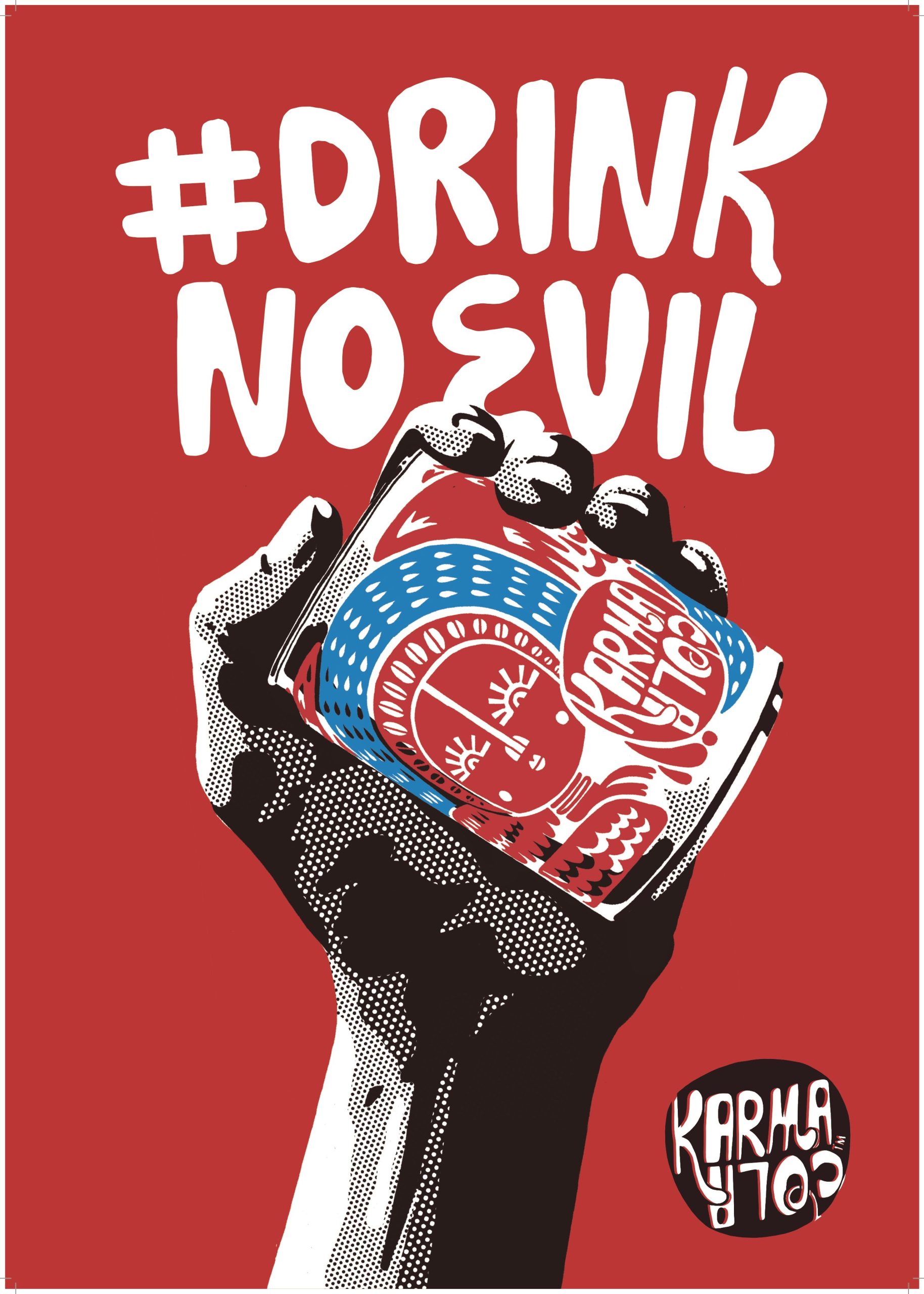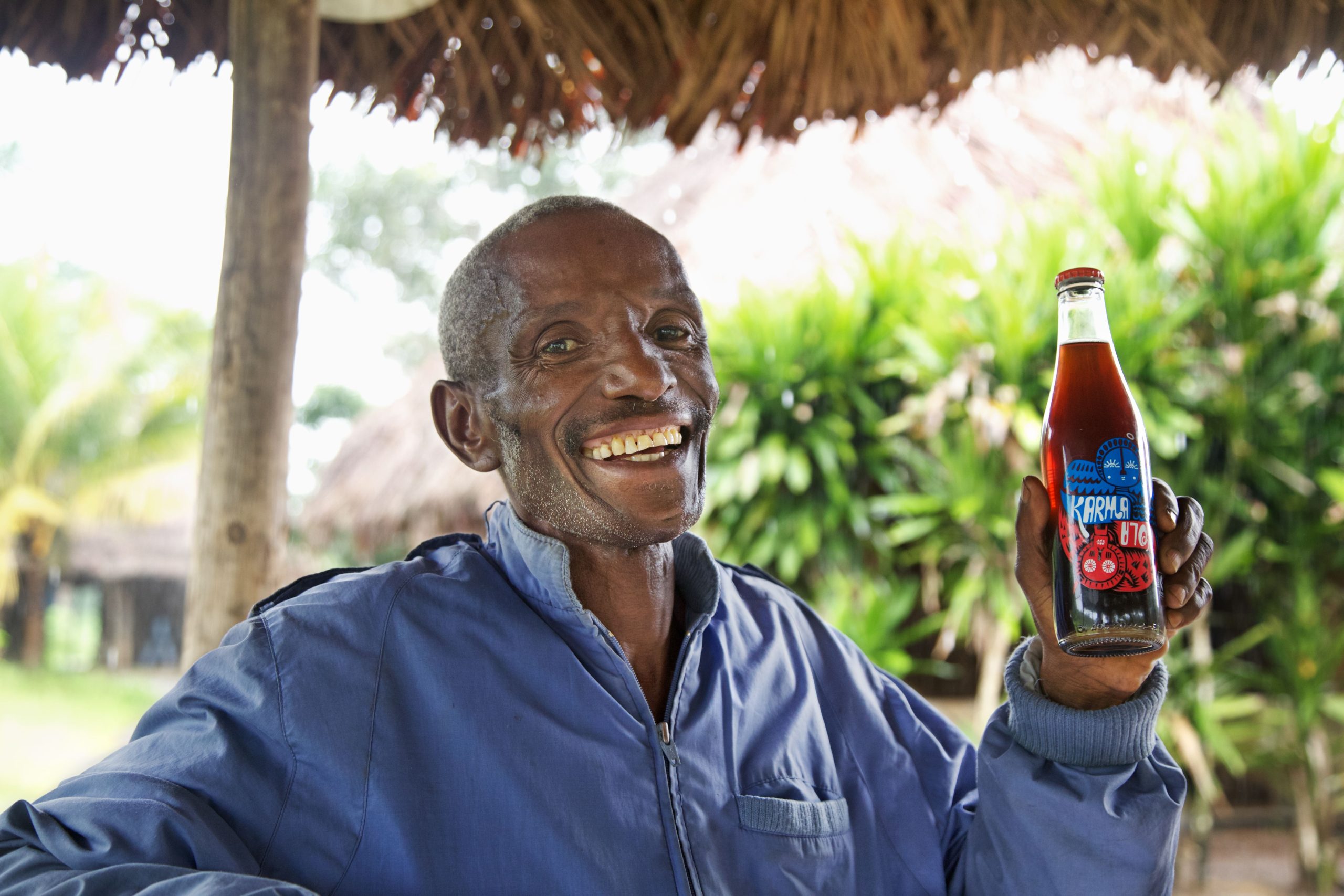Authentic brands: Karma Cola
We sat down Simon Coley, co-founder of Karma Cola, to find out more about the brand’s “good karma” ethos, iconic packaging and the origin of the famous cola taste.

Tell us what is particularly unique about Karma Cola?
There are about two billion cola-branded drinks consumed every day around the world – over a million a minute. But the people who discovered the magical properties of the cola nut don’t make a penny from the world’s most popular fizzy drink. We thought it was time someone did something about that. So we made Karma Cola.
We made Karma Cola — and brother and sister drinks; Sugar Free Karma Cola, Gingerella Ginger Ale, Lemony Lemonade and Summer Orangeade — to taste good and be good, good for the land, good for the people who grow the ingredients, and as good for you as fizzy drinks can be. We set up the Karma Cola Foundation to ensure that happens.
What role would you say Authenticity plays at Karma Cola? How does it set you apart from the competition?
Authenticity is everything to us. When we were researching Karma Cola we looked around for products we could make that would benefit producers in developing countries. Through this research, we discovered a couple of things – one, that cola comes from West Africa and secondly that there’s a massive amount drunk every day. But we also discovered that the world’s biggest brand doesn’t actually use cola in its drinks, so the communities who grow cola don’t receive a penny for something that’s been part of their daily lives and rituals for thousands of years. We decided we’d do something about that, so every time someone buys one of our drinks, money goes back to the people who grow cola in Sierra Leone.
Our strategy was pretty simple. We knew we couldn’t afford to buy loyalty, and we prefer to spend our money on creating the best organic and Fairtrade ethical products out there, but we thought that if we could somehow capture the imaginations of a few people who love the taste of cola and care about the effect they have as consumers – and who care about brands being totally authentic – we’d be able to create a product they’d enjoy and a company they could respect and feel part of.

When Karma Cola launched in 2014, you wanted to take on the market leader Coca-Cola. How has authentic storytelling helped you to stand up to the global giant?
The soft drinks industry is dominated by a few big players with deep pockets. But, actually, we haven’t really gone head to head with them. We had a hunch that because of the massive scale of consumption of a drink that has a secret recipe and no other inherent values other than its popularity and taste, that there was an opportunity for us to reclaim cola as something worthwhile. And something that a growing cohort of consumers who are conscious of their impact on society and the environment could engage with.
We knew there was no way we’d have the money required to generate the awareness of other brands, so we rely on our fans to tell our story and encourage their friends to do the same. To do this effectively, we knew we had to create the best tasting drinks we could and create a story that people wanted to tell and hear.
Despite Coca-Cola being one of the most recognised brands in the world, many people don’t know where the cola taste comes from. Why do you think it’s important to educate consumers about the origin of the famous taste?
Would you drink a coffee made without coffee beans? Or an orange juice without real oranges in it? Probably not. Yet nearly two billion cola-branded drinks are consumed every day without the name ingredient: the cola nut.
Thousands of years ago, long before the invention of carbonated soft drinks, cola nut was traded by the people of West Africa and used in daily rituals. The familiar jingle is “he who brings cola brings life”. Cola is chewed to restore vitality and ease hunger and plays a hugely important spiritual role. Sharing or splitting cola brings communities together – it’s used to welcome friends and strangers, stimulate conversation and helps loved ones commune with their departed. It’s a magical nut and we believe that the farmers who grow it should be recognised – and recompensed – for their crop.
We also think that you deserve to know what you’re putting into your body. We’re totally transparent about what goes into our drinks – it’s on the back of every bottle and can and also in all our literature. We don’t believe in secret recipes or unclear sourcing – if it’s going in your mouth you deserve to know where it’s come from!
Modern consumers are becoming increasingly conscious of their impact on the world and are actively seeking out sustainable and eco-conscious brands. How does Karma Cola communicate its sustainable and ethical initiatives with customers?
Unlike some soft drinks companies, we don’t have billion-dollar advertising budgets. The quality of our drinks and purpose is all we have to convince people to pay a bit more for a drink that isn’t famous.
Most people buy our products because they like the look of them. Our two most valuable pieces of real estate are one that we own – our labels that gets people’s attention – and the psychic real estate in the minds of people who love what we do. We can’t spend millions on advertising, so we prefer to partner with like-minded brands and activists and talk to our supporters with a more authentic voice – one we hope makes them sit up and take notice, or laugh. (Humour is always good.)
Whether it’s Gingerella supporting a charity that helps crusade against ginger bullying, taking a stand on same-sex marriage or body issues, on Brexit or by supporting International Day of the Girl, we want to encourage people to have a reaction and start to think.
By working with partners we’re showing consumers that they have a choice when buying a product and they’d better make it a good one. Ideally, one where others benefit.
Has Karma Cola harnessed user-generated content in order to communicate authentically? If so, do you think it’s helped to build stronger relationships with customers?
Yes, judging by the responses we get from the people who’ve become advocates for our company and what we stand for, something’s working. There are hundreds of examples of people creating their own things out of our characters, packaging and stories all over social media. In fact, some of them do a better job of it than we do.
There’s a grocer who made their own poster saying ‘no coke dealt here’ which was awesome, a man in Texas who made a stained glass window from a melted down Karma Cola bottle, 5,000 red heads in Holland who celebrated Gingerella at their Red Head Festival in Breda and the girl who publishes an Instagram feed called ‘Lemmyslife’, dedicated to the fictitious adventures of Lemony. No amount of advertising can beat that.

Karma Cola is a beautiful brand, and the packaging is equally alluring. What is the story behind the Karma Cola bottle design and what significance does it hold for the brand?
The Moa River runs beside the village of Boma, Sierra Leone, where we source our cola nuts. The river is the background for life in Boma. Villagers draw water from it, catch fish, bathe and travel along it in dugout canoes. In the hot season, when the water levels are low, there are sandy beaches to sunbathe on. In the wet season, it becomes a torrent, sometimes bursting its banks. The river is as tempestuous as the spirit that lives there – Mami Wata.
The mythology of Mami Wata is told all over West Africa. She is a goddess of water, a beautiful mermaid, powerful, dangerous, protective and sensual. In Boma, there is a local legend that says generations ago, the Chief of Boma was visited by Mami Wata in his sleep. She spoke to him and said that Boma would prosper on the condition that, after him, all future Chiefs must be women. Since then her instructions have been followed and all the Chiefs have been female.
Our friend and artist Beck Wheeler drew the angel and devil that fly around the Karma Cola label inspired by this mythology, masks and carvings of Mami Wata and the women that rule in Sierra Leone.
Alongside authenticity, what are Karma Cola’s other brand values?
We have three pillars that we refer to – looks good, tastes good, does good – and everything we do has to work within these brand values.
It takes 0.3 seconds to choose a product by looking at the label in a line up on a shelf or fridge. We knew that the immediate way to encourage someone to reach for our drink would be to catch their eye, so we obsessed about the look of the bottle.
Once we’ve caught their eye and convinced them to take a sip, it’s crucial that the taste delivers beyond expectation. After all, our drinks are made with the best organic and Fairtrade ingredients, sourced from around the globe.
After bringing tastebuds to attention with the first sip we hope we’ve encouraged them to turn the bottle around and read the back of the label, or head to our website or social feeds to learn a little more about our magic and not-so-secret ingredient, karma. This is where they’ll discover the deeper story of our ethical drink and the people who benefit from the purchase they’ve just made.
Do you think brands need to communicate more authentically in order to earn customer loyalty and adoration?
Absolutely. With the proliferation of social media feeds, websites and accessible information, if you’re not authentic and true to your purpose, people will find out really quickly. And then make it easy for others to do so too.
We’ve built our brand by treating our customers and the places we supply our drinks with the same respect as our growers and endeavouring to bring them closer together through the transparency of our supply chain. Having a ‘good’ story backed by ‘good’ works is fundamental. You can’t buy credibility or integrity, you need to earn it.





